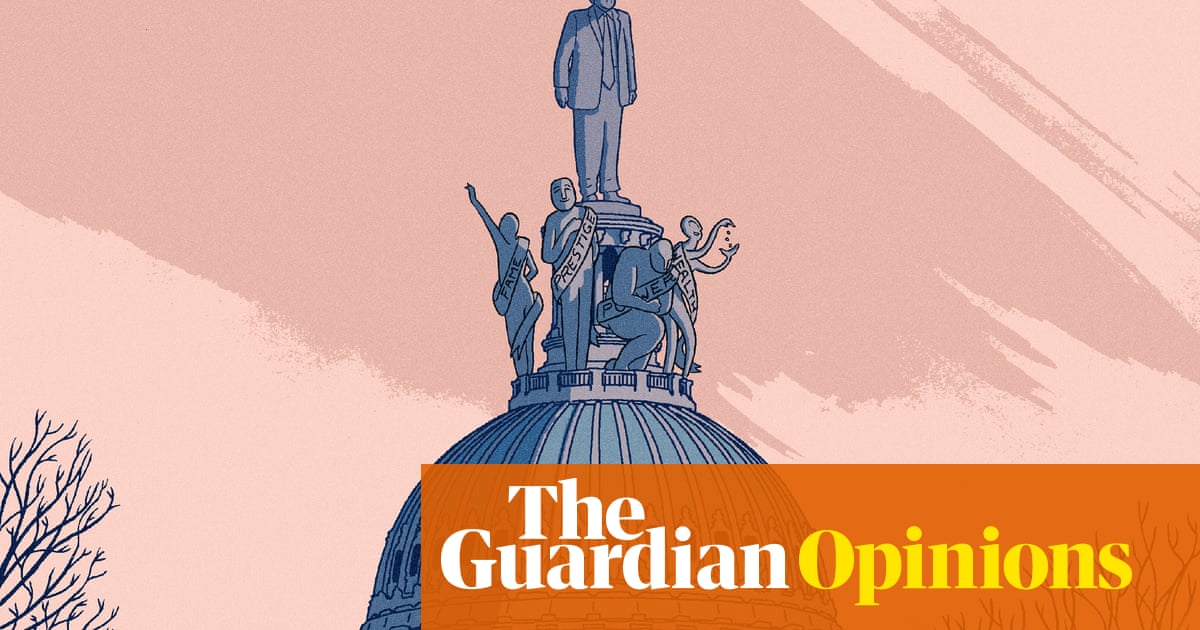US culture is an incubator of ‘extrinsic values’. Nobody embodies them like the Republican frontrunner
Many explanations are proposed for the continued rise of Donald Trump, and the steadfastness of his support, even as the outrages and criminal charges pile up. Some of these explanations are powerful. But there is one I have seen mentioned nowhere, which could, I believe, be the most important: Trump is king of the extrinsics.
Some psychologists believe our values tend to cluster around certain poles, described as “intrinsic” and “extrinsic”. People with a strong set of intrinsic values are inclined towards empathy, intimacy and self-acceptance. They tend to be open to challenge and change, interested in universal rights and equality, and protective of other people and the living world.
People at the extrinsic end of the spectrum are more attracted to prestige, status, image, fame, power and wealth. They are strongly motivated by the prospect of individual reward and praise. They are more likely to objectify and exploit other people, to behave rudely and aggressively and to dismiss social and environmental impacts. They have little interest in cooperation or community. People with a strong set of extrinsic values are more likely to suffer from frustration, dissatisfaction, stress, anxiety, anger and compulsive behaviour.



I think this study is more at the root of the issue:
"One explanation for this might be that conservatives see “loyalty” as an innate moral principle and liberals don’t. There was a study that asked people to explain how they judged scenarios as right or wrong. It came to this conclusion:
Liberals have three principles by which they judge morality: care/harm, fairness/cheating, liberty/oppression
Conservatives have six principles by which they judge morality: care/harm, fairness/cheating, liberty/oppression, loyalty/betrayal, authority/subversion, sanctity/degradation.
This explains why it’s hard for conservatives and liberals to have a debate about morality. Say the topic is flag burning. The conservative would say that burning a flag violates sanctity but a law against it violates liberty, so the principle of sanctity must be balanced against the principle of liberty. The liberal doesn’t see sanctity as a moral principle so only sees the violation of liberty. The liberal can see no reason to ban flag burning and can’t understand the conservative’s reasoning. However, both can agree that murder is wrong because it harms people, and that rich and poor must obey the same traffic laws because of fairness.
These are two extreme examples, but if I understand the theory correctly moral reasoning exists on a spectrum. A question for those who believe they don’t see sanctity as a moral principle at all: if your beloved dog died of natural causes, would you be comfortable serving its body as a meal? If you hesitated at all, you’re at least slightly morally conservative.
Dead link now: https://www-bcf.usc.edu/~jessegra/papers/GrahamHaidtNosek.2009.Moral foundations of liberals and conservatives.JPSP.pdf
Possible alt: https://daverupert.com/2017/08/jonathan-haidt-the-moral-roots-of-liberals-and-conservatives/
More differences:
https://www.pewresearch.org/short-reads/2021/11/22/both-republicans-and-democrats-prioritize-family-but-they-differ-over-other-sources-of-meaning-in-life/
Agreed, but it seems that Trump’s rise has coincided with a change to those 6 conservative values. Sanctity in particular seems to be drastically less important than it used to be, as vulgarity has been embraced by the right to an unprecedented degree. Gone are the days when Ned Flanders and David Brooks personified the typical conservative. Vulgarity, foul language, sexual impropriety, substance and gambling use, etc are all drastically more acceptable today than at any point in America’s post-WWII history
Having said that, there still are elements of Sanctity that these conservatives care about - kneeling during the NFL’s national anthem being one of them. But these occurrences seem to be increasingly uncommon